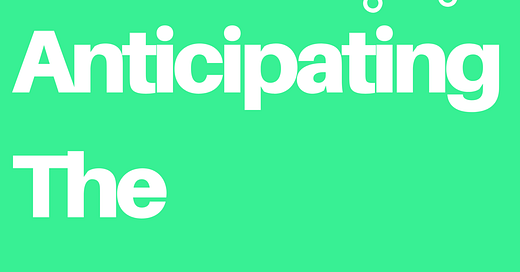Programming Note: Anticipating The Unintended will be on its annual year-end break for the next two weeks. Normal services will resume from Jan 9, 2022.
Happy Holidays.
This is the last edition for 2021. There’s always a temptation to look back at the year gone and arrive at some kind of things-we-learnt-this-year list. As much as we’d like to do that, we really have nothing insightful to offer. It wasn’t a great year for most part because of the pandemic and it is ending on a foreboding note. Anyway, so what do we have in this year-end edition?
We start with talking about the one overriding emotion that the two of us had through the year. What’s that one constant feeling that summed up our view of most events during the year? We then move on to the predictions we had made at the start of 2021 and see how each of us fared. And we close out with books, newsletters, podcasts or videos that we enjoyed greatly. That’s what is on the menu today.
The 2021 State Of Mind
RSJ:
Through the year my mind went back to the lines from one of my favourite poems, The Second Coming by W.B. Yeats. It is somewhat apposite too. Yeats wrote the poem just after WW-1 had ended and during the Spanish flu pandemic. His pregnant wife contracted the flu and survived after a harrowing time. Yeats paints a bleak landscape of disorder and anarchy with warring factions and a divided world order. The voices of reason lack moral strength because the false convictions of the passionate have taken over. To quote Yeats:
“The best lack all conviction, while the worst
Are full of passionate intensity.”
That’s how I felt most of 2021.
Funnily enough, I started noticing many variations of these lines over the past months. I guess I lived through the Baader-Meinhof phenomenon on this one. I have collated them here.
Back in 1871, in the introduction to his book, Descent of Man, Charles Darwin wrote:
“Ignorance more frequently begets confidence than does knowledge: it is those who know little, and not those who know much, who so positively assert that this or that problem will never be solved by science.”
In his 1931 essay, The Triumph of Stupidity, Bertrand Russell wrote:
“The fundamental cause of the trouble is that in the modern world the stupid are cocksure while the intelligent are full of doubt.
Even those of the intelligent who believe that they have a nostrum are too individualistic to combine with other intelligent men from whom they differ on minor points. This was not always the case. A hundred years ago the philosophical radicals formed a school of intelligent men who were just as sure of themselves as the Hitlerites are; the result was that they dominated politics and that the world advanced rapidly both in intelligence and in material well-being.
It is quite true that the intelligence of the philosophical radicals was very limited. It is, I think, undeniable that the best men of the present day have a wider and truer outlook, but the best men of that day had influence, while the best men of this are impotent spectators. Perhaps we shall have to realise that scepticism and intellectual individualism are luxuries which in our tragic age must be forgone, and if intelligence is to be effective, it will have to be combined with a moral fervour which it usually possessed in the past but now usually lacks.”
In his essay, A Cult of Ignorance, published in the Newsweek (1980), Isaac Asimov wrote:
“Anti- intellectualism has been a constant thread winding its way through our political and cultural life, nurtured by the false notion that democracy means that my ignorance is just as good as your knowledge.
Now we have slogans on the part of obscurantists: "Don't trust the experts!"... We have a new buzzword too, for anyone who admires competence, knowledge, learning and skill, and who wishes to spread it around. People like that are called 'elitists'.
...What shall we do about it? We might begin by asking ourselves whether ignorance is so wonderful after all, and whether it makes sense to denounce 'elitism'. I believe that every human being with a physically normal brain can learn a great deal and can be surprisingly intellectual. I believe what we badly need is social approval of learning and social rewards for learning.”
Of course, all of this culminated into a wonderful paper by David Dunning and Justin Kruger titled, “Unskilled and unaware of it: How difficulties in recognizing one’s own incompetence lead to inflated self-assessments”. Published in the Journal of Personality and Social Psychology, Dec 1999, the abstract of the paper asserted:
“People tend to hold overly favorable views of their abilities in many social and intellectual domains. The authors suggest that this overestimation occurs, in part, because people who are unskilled in these domains suffer a dual burden: Not only do these people reach erroneous conclusions and make unfortunate choices, but their incompetence robs them of the metacognitive ability to realize it.”
Thus was born the Dunning-Kruger effect.
It owned 2021.
Pranay:
As for many of you, 2021 was my first year, in many many years, spent entirely at home. Until 2021, there were two neat compartments in my head: a ‘professional’ one and a ‘personal’ one. I associated terms such as ambition, learning, and planning only to the ‘professional’ compartment. On most issues outside that sphere, I thought I could just wing it. To use RSJ’s framing, it was the Dunning-Kruger effect at play in one compartment of life. So, 2021 has been about trying to unlearn many erroneous conclusions I had reached about wellbeing (physical and mental), parenting, relationships, and self-worth. There’s a lot to learn. But just the dissolution of the false assumption that two very different approaches apply to the two spheres of life is liberating.
Our Predictions Report Card
At the start of this year, we were foolhardy enough to make a few predictions. We will see how we fared on them.
RSJ:
Pranay had made an important point about predictions then:
“... predictions are susceptible to what Philip Tetlock calls ‘outcome-irrelevant learning’ — a situation wherein no matter the reality, people are in an excellent position to explain that what happened was consistent with their view.
One way to check outcome-irrelevant learning is first to make specific, measurable predictions and then reflect on real-world outcomes at the end of the prediction horizon. Which, for this newsletter, means we will do another post at the end of 2021 reflecting on our hits and misses.”
I must admit my 10 predictions didn’t exactly fit Pranay’s definition of being specific and measurable. So, as I look back, you can accuse me of conveniently retrofitting the actual outcomes to them. FWIW, let’s see how I fared.
Prediction 1: By the end of 2021, we will all realise we overrated the long-term impact of the pandemic on everything. There won’t be any ‘new normal’ to write home about. Things will be more of the same.
Outcome: Largely true, I would think. Maybe 6/10 on accuracy. No dramatic shift seen on anything yet.
Prediction 2: The size of the stimulus in most developed economies and the amount of liquidity pumped into the system will mean two things – eventual inflation and a repeat of the taper tantrum in future. Deficits have come to mean nothing and any future slowdown in the economy or fall in markets will mean more stimulus.
Outcome: Not bad. I guess 7/10 on this.
Prediction 3: The stock markets are in bubble territory now. But there won’t be any reckoning in 2021. The stocks doing well during the pandemic will continue to do well. The divergence between the real economy and the street will continue to confound all of us.
Outcome: Cannot complain. 7.5/10
Prediction 4: The early signs are of a K-shaped recovery around the world. This will be strengthened in 2021. A small set of companies and people will see a rising graph of growth and prosperity. The long-term impact of the pandemic will be to worsen inequality. The early but definite signs of this will show up in 2021.
Outcome: Again 7.5/10
Prediction 5: Credit offtake will be weak and the revival of consumption story will be dampened because of this. Private investments were trending downwards anyway before the pandemic. Its revival seems unlikely in 2021.
Outcome: Maybe 7/10
Prediction 6: The Chinese economy will lead the global growth engine. Despite its misadventures during the pandemic, China will continue its rise to the top. The Biden administration will take a more accommodative stance towards China. The trade war will subside and the EU will continue to strengthen its relationship with China.
Outcome: Mostly wrong. China has continued to do well but it has its problems. 3/10
Prediction 7: Technology sovereignty will be a key theme in 2021. Countries across the western world will assert their technology independence. The most common form this will take is in keeping Chinese technology companies out of strategic sectors like telecom and finance infrastructure services. Or you could expect heavy fines for restrictive or anti-competitive practices and heavier hand of regulations on these (big tech) companies.
Outcome: Largely right. China itself came down heavily on its tech giants while Lina Khan, the chair of FTC, continued her tirade against Big Tech. 6/10
Prediction 8: How to vaccinate India will be a policy question that will keep everyone busy in the first half of 2021. Everything about vaccines – procurement, pricing, storage, administration and safety – will test our policymakers. My guess is we will do quite well in this entire exercise.
Outcome: I guess we did better than what we expected at the start of 2021. We are still behind on booster doses and vaccines for kids though. 7/10
Prediction 9: It won’t be a great year for reforms. The wrong lessons will be learnt from the protests against farm law reforms. Plus, the usual set of assembly elections and the weak economy post the pandemic will continue to weigh on the government. So good, bold and much-needed reforms across sectors will again go into the backburner.
Outcome: Cannot disagree. Barring Air India sale and some boost to manufacturing, not much happened here. The start-up story isn’t really a government story to own. Then there was the farm law repeal. Enough said. 7/10
Prediction 10: The BJP election machine will have a mixed year. Barring Assam where it should keep its majority and some gains in West Bengal, it won’t see much success. The campaign and the narrative building leading up to elections in Assam and West Bengal will not be for the faint-hearted. There will be a plethora of fake news, violence and no-holds-barred Muslim bashing. The signs are already there on the news channels. The opposition will remain largely ineffective with some kind of split happening in the Congress during the year. But there will also be the earliest sign of some kind of coming together of regional parties to counter BJP in 2024. This seems inevitable.
Outcome: Well, that looks fairly accurate. So 8/10.
Overall, not bad but I will try to be more specific about next year’s predictions.
Pranay:
This is the report card of the five predictions I made at the start of 2021.
Prediction 11: Petrol prices in Bangalore will hit ₹100 at least once before the end of 2021.
Outcome: Petrol prices were at ₹86.47 in Bengaluru on 1st Jan 2021. The prediction was based on the reasoning that excise duties on petrol and diesel are the superhero of last resort for state and union governments. As public spending rose in the backdrop of the second wave of COVID-19, both union and state governments took the easy route of increasing taxes on petrol and diesel. Petrol prices hit the hundred mark in June and galloped to ₹113 by November. Since then, they have settled to just above ₹100. Of course, there were no nationwide protests over the issue. No electoral results were attributed to this price hike, even though the rising inflation would have hit many people hard.
Prediction 12: A maximum of 2 CPSUs will be privatised by the end of 2021.
Outcome: The backdrop of this prediction was the buzz surrounding the union government’s grand scheme to sell its stake in over 25 CPSUs. The Ministry of Finance’s reply in the Lok Sabha has the details. And from what I can gather, just two CPSUs have found a buyer this year — Air India and Central Electronics Limited.
Prediction 13: GST will continue to have the current five tax slabs.
Outcome: My reasoning behind this prediction was that the fiasco on the GST compensation cess has broken the trust between union and state governments, and the latter will not welcome any further changes in the GST regime this year.
Prediction 14: The status quo at Ladakh in terms of territorial control will continue.
Outcome: Just yesterday, the Indian Air Force Chief had this to say:
“the standoff does continue. Disengagement has taken place in certain areas in Eastern Ladakh. But, the complete disengagement has not yet been done I would not like to go into the details, but suffice to say we are deployed, we are prepared to take on any challenge that may face us in that area with the shortest of notice.”
Prediction 15: The number of US service personnel in Afghanistan will fall below 2500 by the end of 2021.
Outcome: The prediction turned out to be true of course. But little did I expect that the withdrawal would put the Taliban in full control of Afghanistan.
Finally, I also had a note related to RSJ’s prediction on US and China. The Biden administration has, indeed, continued key elements of the previous administration’s trade policies on China. In the high tech domain, the restrictions are likely to tighten further.
These were my five predictions. In retrospect, it looks like I made some safe (and obvious?) bets.
Read, Saw Or Heard
We will close with our top recommendations of books, podcasts, newsletters et al, that we came across in 2021.
RSJ:
In no particular order, here are mine
This Is How They Tell Me The World Ends: The Cyberweapons Arms Race. A riveting take on global cyber warfare by Nicole Perloth that reads like a thriller. Deservingly won the 2021 Financial Times Business Book of the Year award.
The Code Breaker: Jennifer Doudna, Gene Editing, and the Future of the Human Race. Walter Issacson’s book couldn’t have been more timely. The history of gene editing, development of CRISPR and how all of it came together to create vaccines for Covid-19 are all part of this absorbing and informative book.
The Light that Failed: A Reckoning. Krastev and Holmes on why liberal democracy faltered in eastern Europe. There are lessons for everyone there.
India’s Founding Moment: The Constitution of a Most Surprising Democracy. Madhav Khosla’s wonderful narration of the people, the ideas and the debates that went into the creation of our Constitution.
Wanderers, Kings, Merchants: The Story of India through Its Languages by Peggy Mohan. A forensic on Indian languages and what they tell us about our history and the evolution of our culture. Civilisation and reclaiming of it is often thrown about loosely in India these days. Our languages hold the secrets of our civilisation. Understanding them may be a useful precondition to whatever it is we are trying to reclaim.
Klara and the Sun by Kazuo Ishiguro. A peek into our future where kids are kept company by artificial friends but love still makes the world go round.
The Plot by Jean Hanff Korelitz. A ‘howdunit’ that keeps you engrossed till the end though you figure out the climax two-thirds of the way. Surprising that way.
The Reith Lectures: Pranay introduced them to me and I have been hooked since.
The Lex Fridman Podcast: The ‘Amit Varma, Sam Harris and Russ Roberts rolled into one’ of science and tech podcasting. Long episodes (many over 5 hours) about deep tech, AI, string theory, ultramarathons, truck driving and whatever else that catches Lex’s fancy.
Ideas of India by Shruti Rajagopalan: Great conversations and a much needed platform to hear from young scholars about their work on India.
Newsletters: Noahopinion by Noah Smith (original and insightful) and Chartbook by Adam Tooze (the best place to find out about new books and interesting ideas). Also, Strange Loop Canon by Rohit (no idea about his last name) and SneakyArt Post by Nishant Jain - two newsletters from Indians based abroad that I found interesting. Read them.
There were other books (esp fiction) and interesting podcast episodes to share but maybe some other time
Pranay:
Humankind: A Hopeful History challenged my Bayesian priors like no other book this year.
The Quillette online magazine usually has pieces that go against the prevailing dominant narratives.
Womaning in India newsletter taught me a lot.
Anirban Mahapatra’s Gyandemic newsletter is full of TILs on new science findings.
Your Undivided Attention Podcast convinced me that our information environment is polluted and we need to take charge of our consumption choices.
Take care. Stay safe. See you in 2022.











Share this post